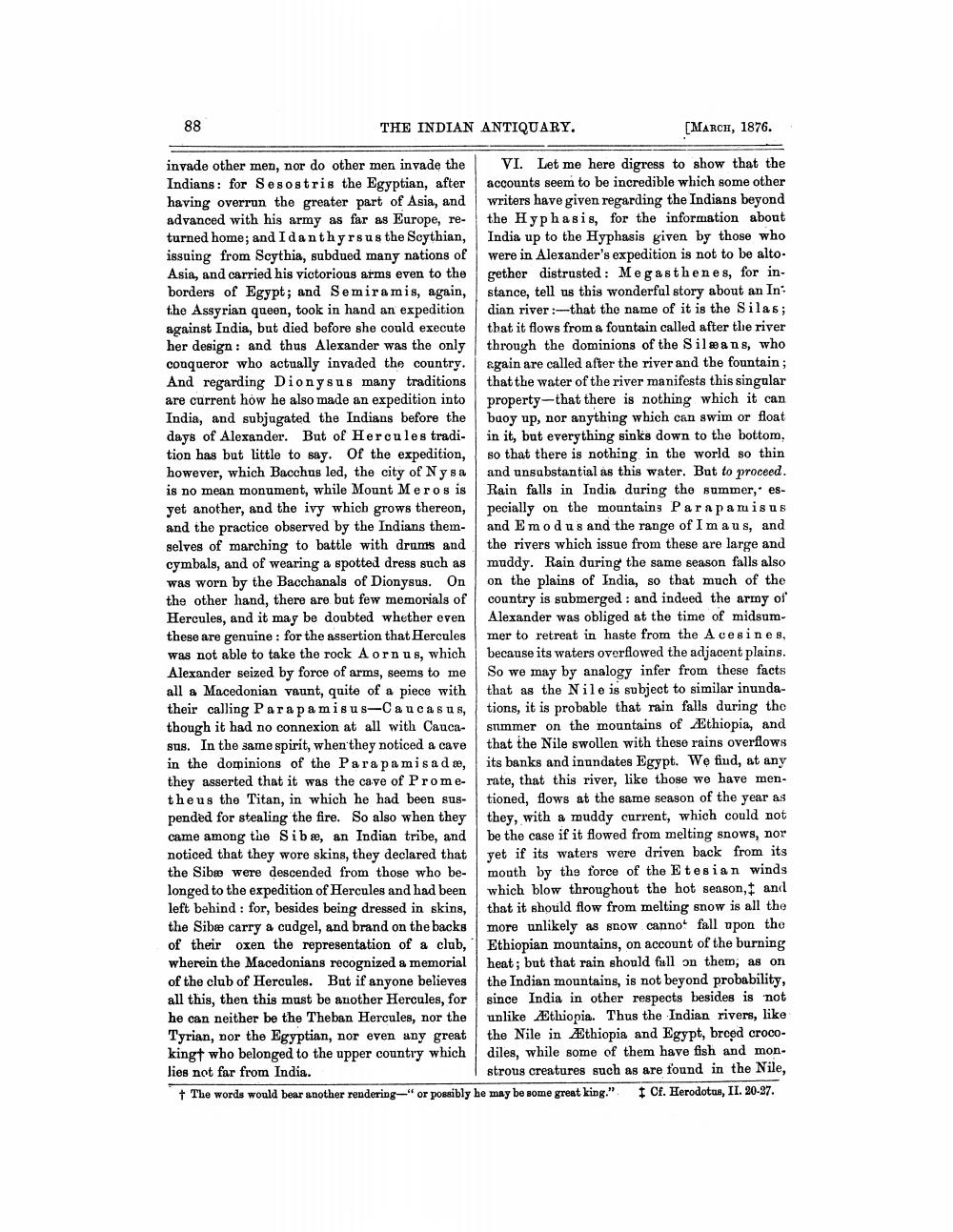________________
88
THE INDIAN ANTIQUARY.
[MARCH, 1876.
VI. Let me here digress to show that the accounts seem to be incredible which some other writers have given regarding the Indians beyond the Hyphasis, for the information about India up to the Hyphasis given by those who were in Alexander's expedition is not to be alto. gether distrusted: Megasthenes, for instance, tell us this wonderful story about an In: dian river: that the name of it is the Silas; that it flows from a fountain called after the river through the dominions of the Sileans, who again are called after the river and the fountain; that the water of the river manifests this singular property-that there is nothing which it can buoy up, nor anything which can swim or float in it, but everything sinks down to the bottom, so that there is nothing in the world so thin and unsubstantial as this water. But to proceed. Rain falls in India during the summer, especially on the mountains Parapa misus and Emo dus and the range of I maus, and the rivers which issue from these are large and muddy. Rain during the same season falls also on the plains of India, so that much of the country is submerged: and indeed the army of Alexander was obliged at the time of midsummer to retreat in haste from the A cesines, because its waters overflowed the adjacent plains. So we may by analogy infer from these facts that as the Nile is subject to similar inundations, it is probable that rain falls during the summer on the mountains of Ethiopia, and that the Nile swollen with these rains overflows its banks and inundates Egypt. We find, at any rate, that this river, like those we have mentioned, flows at the same season of the year as they, with a muddy current, which could not be the case if it flowed from melting snows, nor yet if its waters were driven back from its month by the force of the Etesian winds which blow throughout the hot season, and that it should flow from melting snow is all the more unlikely as snow cannot fall upon the Ethiopian mountains, on account of the burning heat; but that rain should fall on them, as on the Indian mountains, is not beyond probability, since India in other respects besides is not unlike Ethiopia. Thus the Indian rivers, like the Nile in Ethiopia and Egypt, breed crocodiles, while some of them have fish and monstrous creatures such as are found in the Nile,
Cf. Herodotus, II. 20-27.
invade other men, nor do other men invade the Indians: for Sesostris the Egyptian, after having overrun the greater part of Asia, and advanced with his army as far as Europe, returned home; and Idanthyrsus the Scythian, issuing from Scythia, subdued many nations of Asia, and carried his victorious arms even to the borders of Egypt; and Semiramis, again, the Assyrian queen, took in hand an expedition against India, but died before she could execute her design and thus Alexander was the only conqueror who actually invaded the country. And regarding Dionysus many traditions are current how he also made an expedition into India, and subjugated the Indians before the days of Alexander. But of Hercules tradition has but little to say. Of the expedition, however, which Bacchus led, the city of Nysa is no mean monument, while Mount Meros is yet another, and the ivy which grows thereon, and the practice observed by the Indians themselves of marching to battle with drums and cymbals, and of wearing a spotted dress such as was worn by the Bacchanals of Dionysus. On the other hand, there are but few memorials of Hercules, and it may be doubted whether even these are genuine : for the assertion that Hercules was not able to take the rock A orn us, which Alexander seized by force of arms, seems to me all a Macedonian vaunt, quite of a piece with their calling Parapa misus-Caucasus, though it had no connexion at all with Caucasus. In the same spirit, when they noticed a cave in the dominions of the Parapamisad æ, they asserted that it was the cave of Prometheus the Titan, in which he had been suspended for stealing the fire. So also when they came among the Sibæ, an Indian tribe, and noticed that they wore skins, they declared that the Sibee were descended from those who belonged to the expedition of Hercules and had been left behind: for, besides being dressed in skins, the Sibæ carry a cudgel, and brand on the backs of their oxen the representation of a club, wherein the Macedonians recognized a memorial of the club of Hercules. But if anyone believes all this, then this must be another Hercules, for he can neither be the Theban Hercules, nor the Tyrian, nor the Egyptian, nor even any great kingt who belonged to the upper country which lies not far from India.
†The words would bear another rendering-" or possibly he may be some great king."




